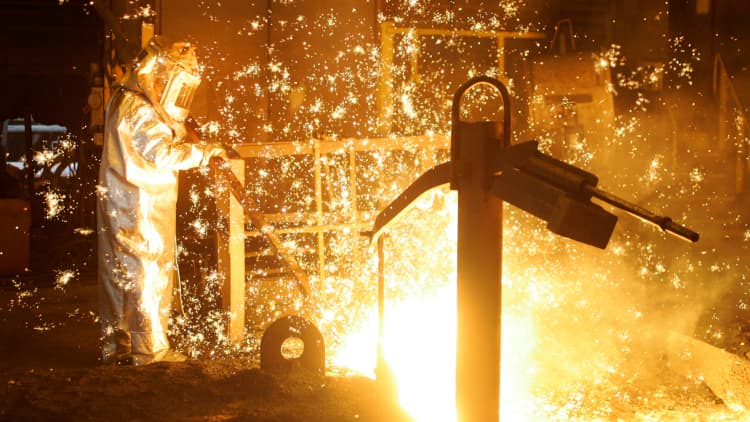
While most of the so-called Trump trades require the president to successfully team up with a Republican-led Congress to make business-friendly laws, there's one group of companies that Trump alone can help and already has, according to Wall Street.
"Our conversations with trade lawyers have noted that the Trump administration has had a 'chilling effect' with respect to growing trade with the United States, especially in Asia," said Credit Suisse research analysts Curt Woodworth and Serena Rocha Calejon in a report Wednesday.
"Trade policy is structurally changing the dynamics of steel trade in the U.S.," they said in the report upgrading the steel sector. They noted that recent checks with some steel traders suggest foreign mills no longer want to bring large quantities of the metal into the U.S. on "concerns about potential targeting in future trade suits."

In late April, President Donald Trump signed a directive asking for a quick probe into whether imports of foreign-made steel threaten U.S. national security.
"We believe the Section 232 investigation has the potential to be one of the largest
catalysts for steel stocks in the past decade," Woodworth and Calejon said in the report.
They upgraded U.S. Steel, Nucor and Steel Dynamics to outperform from neutral, also pointing to steadying energy prices and solid demand from China as support for the steel industry.
On Wednesday, U.S. Steel shares briefly gained more than 6 percent before cutting gains to about 1 percent. Eleven percent of shares available for trading are sold short, according to FactSet.
Trump campaigned on and subsequently adopted an "America First" policy to protect the interests of U.S. companies such as steel makers against overseas firms, which are often subsidized and able to sell at prices far cheaper than U.S. companies can, a practice known as "dumping." For decades, China has been a target of U.S. anti-dumping policy.
After Trump won the presidential election in November, U.S. stocks climbed to record highs on anticipation of U.S. business-friendly policies such as tax reform, infrastructure spending and deregulation.
Most analysts expected financial stocks to benefit the most from those new policies, and the sector led gains in the for much of the postelection rally. However, in the last several weeks, technology stocks have overtaken financials as the top performer since the election as new legislation stalled in Congress and reports raised worries about how Trump is handling an investigation into possible ties between his campaign and Russia.
The market may question whether Trump can get Congress to pass his pro-growth proposals, but as the Credit Suisse analysts note, the administration is serious about — and able to deliver on — steel trade.
In choosing leaders on trade policy, Trump picked individuals known for their anti-China views:
- Wilbur Ross, secretary of Commerce, has criticized other steel-producing countries for being more "protectionist."
- Peter Navarro, author of "Death by China," heads a newly formed National Trade Council.
- Recently confirmed U.S. Trade Representative Robert Lighthizer has negotiated restrictions on steel imports.
The team has already taken significant action toward protecting the interests of U.S. steel producers.
On April 11, Ross announced that the Commerce Department found Korean steel producers have been selling oil country tubular goods into the U.S. market at a rate as much as 24.92 percent below fair value in the U.S. The Commerce Department said it would tell the U.S. Customs and Border Protection agency to "assess duties and collect cash deposits equal to the dumping margins found on all imports of the subject goods from Korea."
At a public hearing Wednesday, Ross indicated more serious action could be taken on foreign steel companies if their actions are found to be damaging to the U.S.
Materials and industrials remain among the top five performing sectors in the S&P 500 since the election. The industries should also benefit from spending on infrastructure, a proposal analysts believe both political parties can agree on.
Larry McDonald, author of The Bear Traps Report investing newsletter, said in a Wednesday note that his team has bought shares of U.S. Steel on weakness.
"The market is punishing names with any dependency on tax reform as the Washington gridlock looks here to say. In our view, this has created an opportunity to buy U.S. Steel at a lower cost basis."
To be sure, the last eight months have sent U.S. Steel's shares on a volatile ride. The stock skyrocketed about 65 percent from the middle of October to early December.
But the company has had its own struggles. In late April, the stock plunged more than 26 percent after U.S. Steel cut guidance and unexpectedly reported a loss. Shares also fell on May 10 when David Burritt became CEO after Mario Longhi stepped down from the position.
The stock remains 51 percent higher year on year.
US Steel 12-month performance
Source: FactSet
— CNBC's Michael Bloom and Natalia Wojcik contributed to this report.


